Introduction
In the blink of an eye, technology has transformed from a niche field into an integral part of daily life, touching every aspect of our existence. From artificial intelligence to the Internet of Things, from blockchain to quantum computing, the rapid acceleration of technological advancements has reshaped industries, societies, and the way we live. We are now standing at the edge of even more dramatic transformations that will redefine how we interact with the world around us.
In this blog post, we will explore the fascinating world of modern technology, examine the groundbreaking innovations that are driving change, and look at the technologies that are poised to redefine the future. From AI-driven automation and immersive virtual worlds to green technologies that combat climate change, we will explore the cutting-edge developments that are shaping tomorrow’s world.
The Rise of Artificial Intelligence: From Automation to Superintelligence
The Journey So Far: AI’s Role in Modern Society
Artificial Intelligence (AI) is no longer a futuristic concept—it’s a tangible and powerful force shaping industries around the globe. AI is everywhere, from voice assistants like Siri and Alexa to self-driving cars, recommendation algorithms on platforms like Netflix and Amazon, and even predictive tools in healthcare. The rapid advancement in machine learning, deep learning, and neural networks has given AI the ability to perform increasingly complex tasks, often surpassing human capabilities in certain fields.
AI’s presence in the workforce is growing exponentially. From customer service bots to data analysis and financial modeling, AI is automating tasks that were once labor-intensive and time-consuming. However, it’s important to note that AI doesn’t replace humans in all areas but instead augments their abilities, enabling higher productivity and efficiency.
The Road Ahead: AI’s Potential in Various Sectors
As AI continues to evolve, its potential is vast. The healthcare sector, for instance, stands to benefit greatly from AI-powered diagnostic tools and robotic surgeries. AI algorithms are already being used to detect early signs of diseases like cancer and to help doctors make more accurate predictions about patient outcomes.
In the field of finance, AI is driving improvements in fraud detection, risk assessment, and customer service. Machine learning algorithms can analyze vast amounts of financial data to identify patterns and predict market trends, providing investors and businesses with valuable insights.
The next frontier for AI lies in superintelligence—machines capable of performing tasks that require complex reasoning, emotion, and creativity. While we are still a long way from achieving true superintelligence, the development of General AI remains a topic of intense research, and many experts believe that we will see monumental advances in the coming decades.
Blockchain Technology: Decentralizing the Future
What is Blockchain?
Blockchain technology, first popularized by Bitcoin, is a decentralized and distributed ledger system that records transactions across multiple computers in such a way that the registered transactions cannot be altered retroactively. While initially designed for cryptocurrencies, blockchain’s potential extends far beyond digital currencies. It provides a high level of security, transparency, and immutability, making it an ideal technology for industries that require reliable and verifiable record-keeping.
Blockchain’s decentralized nature eliminates the need for intermediaries, which makes it incredibly efficient and cost-effective. By removing middlemen, blockchain allows for peer-to-peer transactions and has the potential to streamline operations in various industries, including finance, supply chain management, healthcare, and real estate.
Blockchain’s Expanding Applications
While blockchain’s use in cryptocurrencies like Bitcoin and Ethereum is well known, its impact is being felt across a wide range of industries. In supply chain management, for example, blockchain enables companies to track the journey of products from production to delivery, ensuring transparency and minimizing fraud. The same principles are being applied in healthcare to secure patient data and provide better access to medical records.
Smart contracts, which are self-executing contracts with the terms of the agreement directly written into lines of code, are another promising blockchain application. These contracts can automatically enforce terms when certain conditions are met, reducing the need for intermediaries and ensuring more secure and efficient transactions.
Blockchain technology also has the potential to revolutionize voting systems, providing secure, transparent, and tamper-proof elections. As governments and organizations explore ways to increase transparency and trust in digital transactions, blockchain stands poised to play a central role in shaping the future.
The Internet of Things (IoT): A World of Connected Devices
Defining IoT: The Network of Everything
The Internet of Things (IoT) is the concept of interconnecting everyday objects to the internet, enabling them to collect, exchange, and process data. IoT devices, which range from smart thermostats and wearables to home security systems and industrial sensors, have become an essential part of modern life. These devices collect data, perform automated tasks, and provide real-time feedback, improving both convenience and efficiency for users.
From smart homes that adjust lighting and temperature based on personal preferences to wearable technology that tracks health metrics and fitness goals, IoT has revolutionized how we live and work. The data generated by IoT devices helps to optimize systems and processes, offering insights into everything from traffic patterns to energy consumption.
The Growing Impact of IoT in Industries
The IoT revolution is particularly significant in industries like manufacturing, logistics, and agriculture. Smart factories equipped with IoT sensors can monitor and optimize production lines in real time, leading to cost reductions and improved product quality. In logistics, IoT helps track goods across the entire supply chain, from the warehouse to the final destination, enhancing efficiency and reducing delays.
In agriculture, IoT-enabled devices can monitor soil moisture levels, weather patterns, and crop health, leading to smarter, more sustainable farming practices. By leveraging IoT, farmers can make data-driven decisions that improve yields and reduce resource waste.
As the number of connected devices continues to grow, the 5G network will play a crucial role in ensuring that IoT devices can communicate quickly and efficiently. The combination of IoT and 5G will create a highly interconnected world, offering unprecedented opportunities for innovation and problem-solving.
Quantum Computing: Unlocking the Power of the Universe
What is Quantum Computing?
At the forefront of the technological revolution lies quantum computing, a field of computing that leverages the principles of quantum mechanics to process information in fundamentally new ways. Traditional computers process information in binary form (1s and 0s), but quantum computers use quantum bits or qubits, which can exist in multiple states simultaneously. This property, known as superposition, allows quantum computers to solve complex problems at speeds unimaginable for classical computers.
Quantum computing holds the potential to revolutionize fields such as cryptography, drug discovery, climate modeling, and financial modeling. While large-scale quantum computers are still in the experimental stages, breakthroughs in quantum algorithms, error correction, and qubit coherence are accelerating progress.
The Future of Quantum Computing
Quantum computing’s potential lies in its ability to solve problems that are currently beyond the reach of classical computers. For example, it could vastly improve the accuracy of climate models, helping to predict weather patterns and the effects of climate change. It could also accelerate the process of drug discovery by simulating molecular interactions at an unprecedented level of detail.
In cryptography, quantum computing could both challenge and strengthen security. While quantum computers have the potential to break widely used encryption algorithms, they could also provide the tools to create new, more secure encryption methods. As we move toward a quantum future, the need for quantum-safe cryptography will become more critical.
Although we are still in the early stages of quantum computing, its promise of solving some of the world’s most challenging problems makes it one of the most exciting areas of technological research.
Renewable Energy Technologies: Powering a Sustainable Future
The Global Shift Toward Renewable Energy
As concerns about climate change continue to grow, the world is undergoing a massive shift toward renewable energy sources. Solar, wind, and hydropower have emerged as key alternatives to fossil fuels, offering cleaner, more sustainable solutions for meeting global energy demands. The global push for a carbon-neutral future is driving innovation in energy production, storage, and distribution.
Advancements in solar power technology, for instance, have led to more efficient and affordable solar panels, making renewable energy a viable option for homes and businesses alike. In wind energy, turbines are becoming more powerful and efficient, capable of generating more electricity at lower costs. The rise of offshore wind farms is helping to harness the power of winds at sea, expanding the potential of wind energy on a global scale.
The Role of Energy Storage and Smart Grids
A key challenge in renewable energy is the intermittency of power generation—solar and wind energy, for example, are not always available when demand is highest. Energy storage technologies, such as lithium-ion batteries and hydrogen storage, are becoming increasingly important in addressing this issue. These technologies allow excess energy to be stored and used when renewable sources are not producing electricity, ensuring a steady supply of power.
Smart grids are another innovation that is transforming the energy landscape. These grids use digital technology to optimize the generation, distribution, and consumption of electricity, making it possible to manage renewable energy more efficiently. With the integration of IoT devices, smart grids can monitor real-time energy consumption, reducing waste and improving overall system performance.
As renewable energy technologies continue to advance, they will play an essential role in mitigating climate change and reducing dependence on fossil fuels. The future of energy is undoubtedly green, and technological innovations will be key to making this future a reality.
Conclusion: A Technologically Enhanced Future
The rapid pace of technological advancement is shaping a future that was once confined to the realm of science fiction. AI, blockchain, IoT, quantum computing, and renewable energy technologies are transforming industries, redefining human potential, and offering solutions to some of the world’s most pressing challenges.




